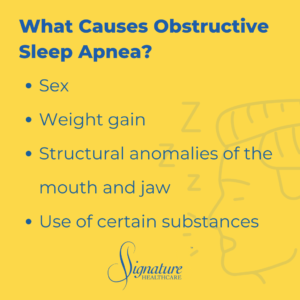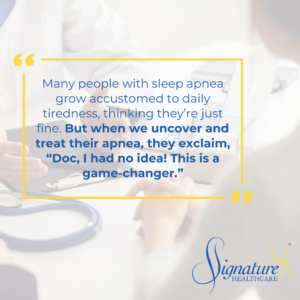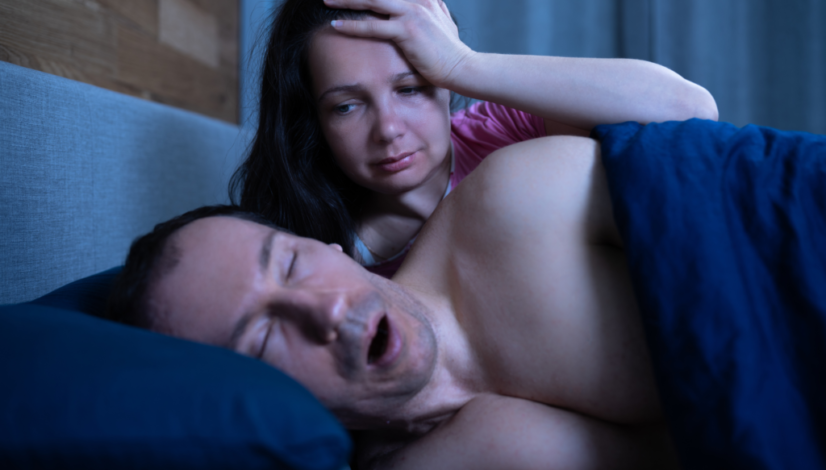What Are the Long-Term Effects of Sleep Apnea?
Did you snore yourself awake again last night? Does your sleep partner worry about your breathing lapses when you slumber?
These are signs you may have sleep apnea.
Many people believe apnea is only loud, intrusive snoring. But could it be a serious medical issue? And what are the long-term effects of sleep apnea?
About Obstructive Sleep Apnea
Obstructive sleep apnea occurs when airflow is impeded during sleep, from the back of the throat down to the upper part of the neck. Nine out of 10 cases of apnea are diagnosed as “obstructive” (in rarer cases, central sleep apnea is a separate condition that can result from stroke, heart failure, or high altitude).
In the U.S., we see an increase in obstructive sleep apnea cases every year. It’s associated with our weight gain epidemic. Startlingly, in the past few years, 67% of adults in the Charlotte region have been characterized as overweight or obese.
Even five or 10 extra pounds may trigger sleep apnea in someone previously symptom-free. Extra fat disproportionately deposited in the subglottic (neck and throat) area affects how air flows in and out. Obstructed flow causes the classic sign of sleep apnea — loud, “freight train” snoring that often impacts the sleep partner as much as the snorer.
Disruptive snoring isn’t the only clue you might have sleep apnea. You may experience troublesome fatigue in your waking hours, known as daytime hypersomnolence. (Don’t confuse this tiredness with the “sinking spell” we sometimes get at 2 or 3 p.m., perhaps after a heavy lunch.)
With daytime hypersomnolence, you’re sleepier than you should be throughout the day, even after 10 hours of sleep the night before. You may awaken feeling unrefreshed. You may note: “I’m falling asleep during business meetings,” or “I can’t stay awake when I’m driving,” or “I nodded off momentarily, mid-meal.”
If you are concerned that your daytime sleepiness points to sleep apnea, first ask yourself how much sleep you typically get each night:
- If you retire at midnight but invariably awaken around 4 a.m., work on the quantity of sleep you get.
- If you regularly get seven, eight, or more hours each night but wake up tired and stay that way throughout the day, your sleep quality may not be giving you a proper recharge.
Other often overlooked sleep apnea indicators include morning headaches and resistant hypertension. Some patients who frequently wake up with a headache don’t realize apnea may be the reason. Sleep apnea can also be behind persistent elevated blood pressure that’s difficult to treat with multiple medications.

What Causes Obstructive Sleep Apnea?
Before we answer the question “What are the long-term effects of sleep apnea?” let’s look at some of its causes:
- Sex. Men are two to three times likelier than women to have obstructive sleep apnea.
- Weight gain. Extra pounds can create excessive fatty tissue in the neck.
- Structural anomalies of the mouth and jaw. Patients with a smaller jaw that sits back, including the tongue, are predisposed to apnea.
- Use of certain substances. Alcohol and sedatives relax the mouth and jaw muscles, allowing the tongue to slide back and obstruct airflow.
When a snorer has a mix of medical conditions — such as weight changes and high blood pressure — that could be attributable to other issues, we may request a specialized sleep study for a precise diagnosis.
Does Obstructive Sleep Apnea Affect Health?
Sleep apnea increases the risk of many health problems. How does it impact the snorer in the short term? And what are the long-term effects of sleep apnea?
Short-Term Risks of Obstructive Sleep Apnea:
- All-day bouts of fatigue
- Motor vehicle accidents (asleep-at-the-wheel accidents are nearly 2.5 times likelier in apnea sufferers)
- Brain fog and depression
- Lowered thresholds of pain
- Increasingly sedentary behavior due to chronic tiredness, affecting fitness and emotional and cognitive health
Long-Term Effects of Obstructive Sleep Apnea:
- Depression. Chronic, excessive sleepiness often leads to mood disorders.
- Cardiovascular complications. Sleep apnea causes an increase in stress hormones (adrenaline and cortisol) to circulate through the body. When combined with chronic low oxygen levels during sleep, this cycle can lead to:
- Stroke
- Heart disease
- Heart failure
- Hypertension
- Pulmonary hypertension
- Atrial fibrillation (AFib)
Limited studies show that treating sleep apnea doesn’t necessarily reduce a patient’s risk for issues like heart attack, heart failure, stroke, or pulmonary hypertension. However, we know that controlling weight reduces those risks substantially.
How to Treat Obstructive Sleep Apnea
The gold standard for treating sleep apnea involves positive pressure.
A continuous positive airway pressure (CPAP) machine is a positive-pressure ventilation unit that a patient wears during sleep to oxygenate the body and reduce the effect of apneic episodes. Wearing a CPAP mask helps prevent sleep apnea.
Long-term studies are needed to determine if a CPAP machine may help with blood pressure, atrial fibrillation, or other cardiovascular issues. Treating mild-to-moderate sleep apnea is unlikely to improve these conditions. However, treating severe sleep apnea (as diagnosed by a sleep study) might be effective in reversing some of these complications, even in a patient with no obvious symptoms of sleep apnea.
Screen for Obstructive Sleep Apnea
Most men and women snore a little bit. That doesn’t necessarily mean they have sleep apnea or need a sleep study. However, if they snore and they’ve had a heart attack, AFib, or resistant high blood pressure, regardless of the presence or absence of daytime symptoms of sleep apnea, we may recommend a sleep study to look for sleep apnea (see above).
If it reveals severe sleep apnea, I recommend treatment when the patient is amenable. I do this for the potential benefit, even if the research data is inconclusive about the connection.
For example, if my patient is a 50-year-old man who’s had a heart attack and his spouse confirms that he snores loudly but has normal daytime energy, I may still recommend a sleep study to see if he has (severe) sleep apnea. We never know what we may discover and improve.
Have you ever been driving down the road when your ears pop unexpectedly? Suddenly, you hear better, even though you didn’t realize you were hearing poorly previously.
Similarly, many people with sleep apnea grow accustomed to daily tiredness, thinking they’re just fine. But when we uncover and treat their apnea, they exclaim, “Doc, I had no idea! This is a game-changer.”

Approaches to Screening
There’s currently a trend toward in-home sleep apnea testing. Devices, software, and algorithms that detect apnea are improving. If a patient is overweight and chronically tired, has high blood pressure, snores, and their sleep partner says they have gaps in breathing at night, I request an in-home study.
However, home sleep studies won’t pick up certain conditions, like restless leg syndrome — we run that type of diagnostic in a sleep lab. Sleep-lab studies can also determine how patients respond to treatment when their apnea is diagnosed.
Your doctor determines whether a home sleep study or a clinic-based study will best serve you. Several options available through your physician include:
While CPAP is the gold standard in devices for treating and reducing obstructive sleep apnea, various oral appliances and bite guards are available for patients who don’t tolerate CPAP. The Inspire device — a surgically implanted nerve stimulator that stabilizes throat muscles during sleep — has narrow qualifying criteria but is also proven effective.
Of course, not everyone who snores has apnea. Even if a study shows no sleep apnea, we can prescribe helpful nighttime oral appliances that fit like a bite guard to eliminate or drastically reduce snoring.
We’ll Help You Sleep Well
If you or your sleep partner wake in the morning feeling unrefreshed or are concerned about snoring and nighttime breathing pauses, your Signature Healthcare physician can help.
We’re happy to discuss sleep apnea in-depth and recommend testing as needed. We can also answer your questions, including “What are the long-term effects of sleep apnea?”
Contact us today. We’ll help you get a restful sleep.

Dr. Marshall Silverman
Dr. Marshall Silverman, MD, a board-certified internal medicine specialist with over two decades of experience in Charlotte, combines his clinical role with academic pursuits as a clinical associate professor at UNC-Chapel Hill. His diverse interests span from disc golfing and woodworking to playing the violin and authoring illustrated children’s poetry books, reflecting a unique blend of medical professionalism and creative expression.

